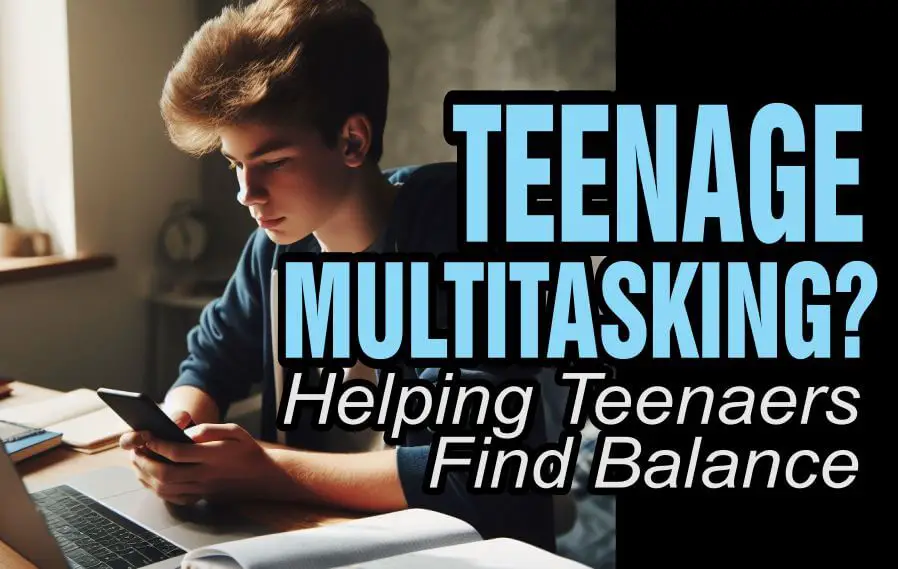Last updated on August 23rd, 2024 at 02:51 pm
Discover how teenagers can combat teenage multitasking. Explore strategies to improve focus, manage time, and reduce stress.
In recent times, teenagers are faced with a multitude of distractions and responsibilities, from schoolwork and extracurricular activities to social media and part-time jobs.
As a result, many teenagers find themselves multitasking daily, attempting to juggle multiple tasks simultaneously.
While multitasking may seem like a necessary skill in a fast-paced world, it can have detrimental effects on teenagers’ well-being and academic performance.
In this blog post, we will explore the impact of multitasking on teenagers and provide practical strategies to help them find balance in their lives.
Table of Contents
- Overview of Task Juggling
- What Research Say
- The Multitasking Dilemma
- The Impact of Multitasking on Teenagers
- Strategies for Finding Balance with Multitasking in Teenagers
- Frequently Asked Questions
- Final Thoughts
Overview of Task Juggling

Task juggling refers to the practice of managing multiple tasks or activities simultaneously.
It involves switching attention between different tasks, often in rapid succession, in an attempt to handle various responsibilities at once.
While task juggling can provide a sense of productivity, it can also lead to decreased focus, increased stress, and reduced overall efficiency.
Effective time management, prioritization, and the ability to maintain focus on one task at a time are essential skills for minimizing the negative effects of task juggling and achieving optimal productivity and well-being.
What Research Say
Heavy multitasking skills can be very detrimental to teenagers with their negative impacts.
This is because, at that age, the brain is still developing and forming important neural connections.
Chronically dividing attention and constantly being distracted would have a long-term unpleasant impact on how the connections form.
Though this area requires more research, it is believed that teenagers who are particularly involved in media multitasking skills would be more vulnerable to any negative effects of the act.
This research believes that the damage done to the brain function by trying to handle tasks simultaneously is temporary and can be reversed when the multitasker becomes a monotasker.
As more research and studies are expected to determine the effects of combining tasks on the brain, what remains constant is that it predisposes people to danger and has negative brain effects.
The Multitasking Dilemma

Teenagers today are often referred to as the “multitasking generation,” as they navigate through a constant stream of information and activities.
With the prevalence of smartphones, social media, and instant messaging, teenagers are frequently switching between tasks, such as texting while doing homework, scrolling through social media while studying, or listening to music while completing assignments.
While multitasking may seem like a way to get more done in less time, research has shown that it can impair cognitive performance and lead to decreased productivity.
The Impact of Multitasking on Teenagers
The impact of multitasking on teenagers can be significant and wide-ranging. Here are some key effects:
1. Reduced Focus: Multitasking can lead to a decreased ability to concentrate on individual tasks, resulting in lower quality work and reduced learning retention.
2. Increased Stress: Juggling multiple tasks simultaneously can elevate stress levels in teenagers, leading to feelings of overwhelm and anxiety.
3. Impaired Time Management: Multitasking may hinder the development of effective time management skills, as teenagers may struggle to allocate appropriate time to each task.
4. Academic Performance: Excessive multitasking can negatively impact academic performance, as it may lead to incomplete assignments, lower grades, and an overall decline in scholastic achievement.
5. Emotional Well-being: Multitasking can contribute to emotional strain, as teenagers may feel pressured to constantly switch between tasks, leading to heightened frustration and fatigue.
6. Social Interaction: Constant multitasking, particularly through digital devices, can impede face-to-face social interaction, potentially affecting the development of interpersonal skills and relationships.
Strategies for Finding Balance with Multitasking in Teenagers

1. Prioritize Tasks
Encourage teenagers to prioritize their tasks and allocate dedicated time for each activity.
By creating a schedule and setting clear priorities, teenagers can focus on one task at a time, leading to better concentration and improved productivity.
2. Time Management Skills
Teach teenagers effective time management skills, such as creating to-do lists, setting realistic goals, and breaking down larger tasks into smaller, manageable steps.
By learning to manage their time efficiently, teenagers can reduce the need for multitasking and approach their responsibilities with a clear plan.
3. Minimize Distractions
Help teenagers identify and minimize distractions in their environment, such as turning off notifications on their devices, finding a quiet study space, and setting boundaries for screen time.
By creating a conducive environment for focused work, teenagers can reduce the temptation to multitask.
4. Mindfulness Practices
Introduce teenagers to mindfulness techniques, such as meditation, deep breathing exercises, and yoga.
These practices can help teenagers cultivate a sense of calm and focus, allowing them to approach tasks with a clear and centered mindset.
5. Single-Tasking Mindset
Encourage teenagers to embrace a single-tasking mindset by emphasizing the importance of giving their full attention to one task at a time.
By focusing on the present moment and avoiding the urge to multitask, teenagers can improve the quality of their work and reduce stress.
6. Healthy Breaks
Emphasize the importance of taking regular breaks to rest and recharge. Encourage teenagers to engage in physical activity, spend time outdoors, or pursue hobbies they enjoy during their downtime.
By incorporating healthy breaks into their routine, teenagers can maintain a balance between work and leisure.
7. Open Communication
Create an open and supportive environment where teenagers feel comfortable discussing their challenges and seeking guidance.
Encourage open communication about time management, workload, and stress management, and provide guidance and support as needed.
8. Set Realistic Expectations
Help teenagers set realistic expectations for themselves and avoid overcommitting to too many activities.
Encourage them to prioritize their well-being and recognize the importance of balance in their lives.
9. Model Healthy Habits
As adults, it’s important to model healthy habits and demonstrate the value of focused attention and balance.
By setting a positive example, adults can inspire teenagers to adopt healthy habits and find balance in their own lives.
10. Seek Professional Support
If teenagers are struggling with excessive multitasking and its impact on their well-being, consider seeking professional support from counselors, therapists, or educators who can provide guidance and support tailored to their individual needs.
Frequently Asked Questions
Why is teenage multitasking a concern?
Teenage multitasking can lead to decreased focus, lower productivity, and increased stress, impacting academic performance and overall well-being.
How can parents help teenagers find balance?
Parents can help by teaching time management, encouraging breaks, minimizing distractions, and fostering open communication about workload and stress.
What are the risks of excessive multitasking for teenagers?
Excessive multitasking can lead to reduced attention span, heightened anxiety, and lower quality of work, affecting teenagers’ academic and emotional well-being.
What strategies can teenagers use to manage multitasking?
Teenagers can prioritize tasks, practice mindfulness, minimize distractions, and embrace a single-tasking mindset to improve focus and productivity.
Final Thoughts
Helping teenagers find balance and combat teenage multitasking in a world filled with distractions and responsibilities is essential for their well-being and academic success.
By equipping teenagers with practical strategies to manage their time effectively, minimize distractions, and cultivate a focused mindset, we can empower them to navigate their daily tasks with clarity and purpose.
By promoting a culture of balance and mindfulness, we can support teenagers in developing healthy habits that will serve them well into adulthood.
References:
- https://blog.siliconvalleyinternational.org/10-tips-to-help-your-adolescent-find-balance-in-the-digital-age
- https://www.qustodio.com/en/blog/what-is-media-multitasking/
Pyo Merez (PsyD) is a distinguished adolescent and adult psychologist at the forefront of mental health advocacy.
With expertise in cognitive and developmental psychology, focusing on social relationships, cultural contexts, and individual differences, Pyo has dedicated his career to empowering adolescents and adults.
As a sought-after speaker and panelist, Pyo shares invaluable insights on issues affecting young people, contributing to a deeper understanding of mental health and well-being in today's society.


